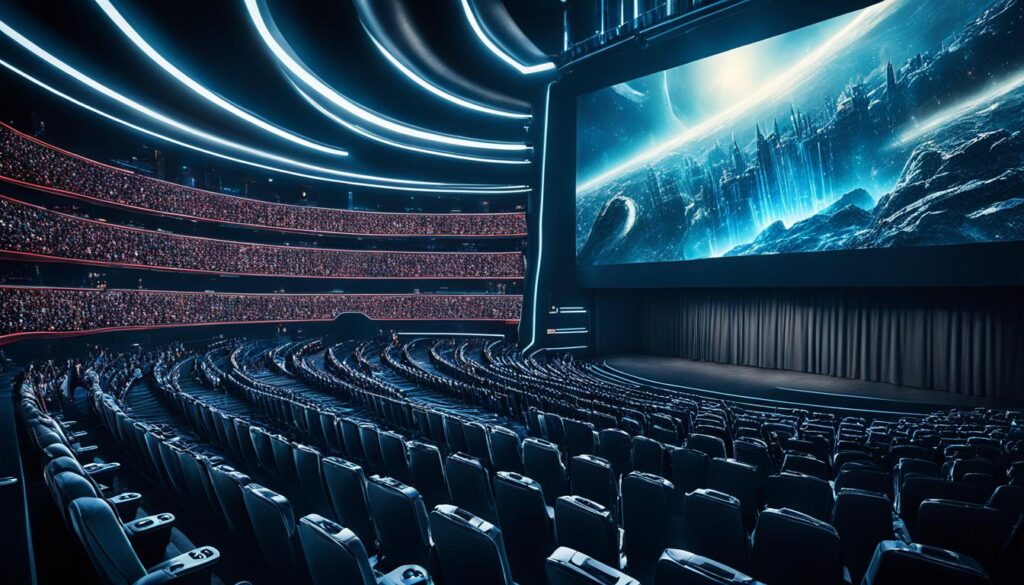The movie industry might soon experience a quantum leap. Quantum computing technology is advancing swiftly, making AI-generated movies a strong contender for box office dominance. This could fundamentally change traditional filmmaking, introducing a new era that redefines creativity and entertainment.
Quantum computing-generated blockbusters spark intriguing questions about cinema’s future. Can AI algorithms replicate human storytelling and deliver emotionally impactful narratives? How will this technology affect screenwriters, directors, and actors? As we delve into quantum computing’s potential in film, we must weigh both the promising prospects and the hurdles ahead.
This article will explore AI-generated movies and their implications for the entertainment industry. We’ll cover the technical aspects of movie creation, the philosophical impact on creativity, and how it might change audience engagement. We aim to give a thorough look at this emerging trend and its potential effects on cinema’s future.
The Potential of Quantum Computing in the Film Industry
The film industry is poised to greatly benefit from the advancements in quantum computing. This technology could revolutionize movie production by streamlining processes, cutting costs, and enhancing creative storytelling. By leveraging quantum computing, studios can optimize complex tasks efficiently, leading to faster and more agile production workflows.
Quantum computing offers a significant boost to movie production efficiency. It can tackle tasks like scheduling and resource allocation with unprecedented speed and accuracy. This means studios can bring projects to fruition more swiftly and economically, enhancing their competitive edge.

Moreover, quantum computing can lead to substantial cost savings in filmmaking. By applying quantum simulations and analytics, studios can make better decisions on budgeting and marketing strategies. Quantum algorithms pinpoint the most cost-effective ways to achieve desired outcomes, thus minimizing financial risks and maximizing returns.
The real excitement lies in how quantum computing could transform storytelling in cinema. It enables the processing of vast data sets and exploration of numerous possibilities. This could lead to the creation of unique storylines, characters, and visual effects, pushing the envelope of traditional filmmaking. Some potential applications include:
- Generating complex, multi-layered narratives with intricate plot twists and character arcs
- Creating hyper-realistic virtual environments and characters that seamlessly blend with live-action footage
- Developing advanced AI-driven tools for scriptwriting, storyboarding, and concept development
- Enabling real-time, interactive experiences that allow audiences to shape the narrative as the movie unfolds
As quantum computing advances, it promises to transform the film industry. By adopting these technologies, studios can unlock new heights of creativity, efficiency, and audience engagement. This could usher in a new era of cinematic excellence.
Quantum Computing Generated Box Office Movie – 100 Percent Generated? Future!
In the not-so-distant future, we may see the first fully AI-generated movie hitting theaters. Quantum computing’s rapid progress makes it possible to create a blockbuster film without human involvement. This could change the movie industry dramatically.
Picture a movie entirely made by a quantum computer, from script to soundtrack. The AI could craft unique stories, characters, and effects, surpassing human creativity. Such a movie’s success would highlight quantum computing’s power and its potential to transform entertainment.

But, how will audiences react to an AI-generated movie? Will they welcome this new form of entertainment, or will they miss the human touch in traditional films? The response could vary, with some admiring the tech and others finding it lacking in emotional depth.
Despite potential hurdles, a quantum computing generated movie’s success could reshape the industry. It could lead to more diverse and innovative films, and lower traditional filmmaking costs. It could also usher in a new era of movie interaction with AI-generated content.
As we approach this new frontier, it’s evident that quantum computing will shape the future of movies. The possibilities are vast, and the potential for success is huge. Whether audiences will fully accept this new form of entertainment is uncertain. Yet, one thing is clear: the movie industry is set for a significant transformation, with quantum computing leading the way.
The Impact on Traditional Filmmaking and Creativity
Quantum computing’s progress is stirring concerns about its effect on traditional filmmaking and human creativity. Some worry that AI-generated movies might replace human filmmakers. Yet, others view it as a chance for a new kind of collaboration between humans and machines.
As AI takes its place in the industry, filmmakers will need to adapt. They will focus more on creative direction, storytelling, and artistic vision. Human creativity will still be key in making AI-generated films emotionally impactful and artistically true.
Working together, human artists and quantum computing systems could create groundbreaking films. This partnership could lead to movies that are both technically stunning and emotionally deep. By combining the power of quantum systems with human creativity, the industry might produce films that stand out.
Despite AI’s potential, it’s vital to remember what human creators bring to the table. Their unique perspectives and experiences can’t be replicated by machines. Human filmmakers have a knack for telling stories that touch audiences, stir emotions, and make us think.
The film industry must find a balance as it incorporates quantum computing and AI. By working together, humans and machines can use AI’s strengths while keeping filmmaking a human art form. This approach will ensure the industry’s future is both innovative and true to its creative roots.
Challenges and Limitations of Quantum Computing in Movie Generation
Quantum computing is set to transform the film industry, yet it faces significant hurdles. A major challenge is the need for vast data to train and run quantum algorithms. Creating a full-length film demands a huge dataset, including visuals, sound, and storylines, which could be hard to gather and manage.
The technology is still in its nascent stages, and the power needed to make a movie is far off. Researchers and engineers are striving to enhance quantum systems. However, it might take several years or decades to reach the required computational strength.
There are also ethical concerns. Quantum computing’s ability to produce realistic content raises concerns about misuse. Issues like intellectual property, creative rights, and the spread of false information through AI-generated films need careful consideration.
Moreover, the integration of quantum computing in filmmaking questions the role of human creativity and artistic expression. AI algorithms can process vast data and generate content, but they might not replicate the complexity, emotion, and originality humans bring. Finding a balance between quantum efficiency and human creativity is crucial.
Overcoming these challenges requires a joint effort from researchers, filmmakers, policymakers, and industry leaders. By discussing and solving these issues, we can use quantum computing in filmmaking effectively. This approach will help mitigate risks and protect the filmmaking process’s integrity.
The Future of Movie Consumption and Audience Engagement
Quantum computing is set to revolutionize the film industry, changing how we watch and interact with movies. It could lead to personalized movie experiences, tailored to each viewer’s tastes. Picture a future where streaming platforms analyze your viewing habits and emotional responses to craft a unique experience for you.
Interactive storytelling is also on the rise, thanks to quantum computing. Filmmakers could create complex stories that change based on what you want to see. This would merge traditional movies with video games, offering a new kind of immersive entertainment.
Quantum computing is also transforming movie platforms. It can handle vast data and create ultra-realistic virtual worlds. Imagine stepping into a VR theater where the movie surrounds you, or joining a live screening with people worldwide.
As quantum computing grows, movie watching and experiencing will change. We might see:
- Personalized movie recommendations from advanced AI
- Interactive movies where your choices shape the story
- Virtual and augmented reality experiences that make movies come alive
- Real-time collaboration between filmmakers and audiences
The future of movies with quantum computing is still evolving, but it promises to be exciting. It will change how we experience cinema, making it more engaging and transformative.
Conclusion
The future of cinema is set for a significant transformation with quantum computing’s emergence. This technology could profoundly impact the entertainment industry, opening new doors for creativity and changing how movies are made and viewed. The concept of movies generated by quantum computing may seem far-fetched, yet the swift progress in this area hints at its potential reality sooner than anticipated.
Yet, it’s vital to ensure that the evolution of the entertainment sector doesn’t overshadow human creativity and artistic insight. As we adopt quantum computing’s advancements, we must safeguard the core of storytelling and the distinctive viewpoints filmmakers contribute. The future of cinema requires a harmonious blend of technological progress and the human element that makes films engaging.
The prospect of quantum computing’s influence on the movie industry is thrilling, unveiling a realm of possibilities. Navigating this new terrain demands an open-minded approach, a readiness to adapt, and a dedication to fostering the creative essence of filmmaking. By embracing these principles, we can guarantee that the future of cinema remains technologically sophisticated yet emotionally impactful and significant to global audiences.
